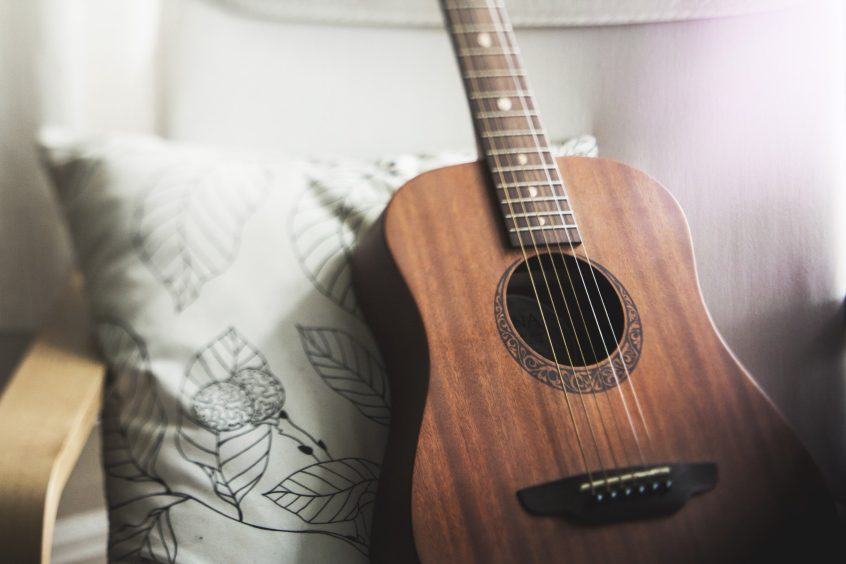While it doesn’t affect every parent, research (1) proves that the “empty nest syndrome” does, in fact, exist. Approximately 30 percent of the 78 million baby boomers in the U.S. experience feelings of depression, sadness, and grief when their kids leave their proverbial nest. While it’s easy to focus on the negatives when you’re feeling low, one of the many benefits associated with becoming an empty-nester includes having more spare time (and possibly, money) to do things that bring you pleasure. Whether it’s picking up an instrument, seeing a concert, or analyzing different melodies, researchers have found that music has copious physical and mental benefits (2) for seniors.
Benefits of music
Here’s what boomers can expect by coming more in tune with the musical world.
Cognitive and Physical Benefits
Studies indicate that one out of every eight baby boomers has memory loss issues, but research shows that regularly playing an instrument can improve cognitive skills. In fact, it might enhance IQ by an impressive seven points and reduce stress on a molecular level. Merely listening to a favourite song or artist has the power to take one back to a happier place or time, thus boosting mood. Music also serves as an outlet for expressing feelings even more than writing or speaking — unless it turns into singing — and can improve relationships and bonds. Here are some ways how seniors can incorporate music into their daily lives:
Comfort and Solace
Empty nesters who find themselves alone are more prone to becoming socially isolated or repressed. A silent, empty home can lead to crippling depression, anxiety and other similar issues that can detract from overall quality of life. Music offers a wonderful way not necessarily to “replace” the physical presence of loved ones, but rather it functions as more of a coping mechanism. This is particularly important for those who are divorced or widowed where the sense of isolation is greater.
Emotional Stability
As we age, keeping our emotions in control and maintaining a content mindset becomes more important. That said, we all feel a little blue from time to time, and some empty nesters may have a harder time staying positive given their living situations. This is where strumming that guitar in the corner or putting on a favourite record can go a long way in encouraging a better mood. In fact, positive, upbeat music including old favourites can instill a sense of comfort and encourage a healthier thought process, particularly amongst those who live alone.
Ways to bring more music into your life
Let’s explore some ways to bring more music into your life:
Learn to Play an Instrument
Researchers believe that learning how to play an instrument (3) later in life is easier than one may think. Because adults have had a lifetime of listening to music, they’re more disciplined, and playing is by the power of choice.
Create a Soundproof Space for Jam Sessions
Creating a soundproof room within the home offers privacy and the freedom to play loud music without disrupting the neighbours or spouse/partner. The average cost for materials and labour is $1,682, but this does not include any significant remodeling, to include modifying existing structures or surfaces.
Play Music While Doing Chores
Nothing passes the time faster when doing unpleasant tasks such as house cleaning than playing upbeat tunes in the process. Depending on the beat, music may actually help you complete the work at a faster rate.
Listen to Music Before Going to Sleep
Studies (4) suggest that listening to music that brings you pleasure right before going to bed can actually improve sleep quality — but the songs have to be slower than one’s heartbeat in order to be effective.
Head to a Concert or Musical Event
Whether it’s a musical, a free classical concert in the park or a headliner at a top venue, the visual and audible combination that comes with attending a structured event can boost mood while opening up the door to having a quality bonding experience with others.
Journal About Music
Identifying feelings associated with certain types of music can help seniors become in tune with their emotions. Simple notes associated with songs listened to on a daily basis is all it takes. However, this could snowball into the desire to research other aspects of a song, such as the artist’s inspiration, deciphering lyrics, etc.
One need not be a musical genius to reap the health benefits that come with playing an instrument, writing a song, singing in the shower, or dancing to a favourite tune in the living room. It’s never too late in life to pick up a new hobby or revisit an old one, so age should not prohibit seniors from becoming musically inclined. To help squash any fears or feelings of insecurity, there are several online and community classes and organizations that can help boomers stay enthusiastic and engaged for the long term.
Sources
-
https://www.huffingtonpost.com/sharon-bush/the-empty-nest-syndrome-i_b_13372740.html
-
https://www.skininc.com/treatments/wellness/alternativetherapies/28284229.html
-
https://www.huffingtonpost.ca/entry/playing-an-instrument_n_4903835
-
https://www.dubslabs.com/blog/listening-to-music-before-sleep/
Photo credit: Gavin Whitner, MusicOomph.com


